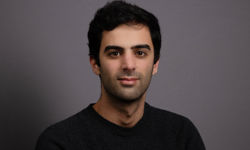This is the text of Peter Preston’s address at St Bride’s Church, in the presence of HRH The Duchess of Cornwall:
Your Royal Highness, ladies and gentlemen. There's a tragic poignancy to this service today. For two years ago, in this church, from this lectern, Marie Colvin told us that "covering a war means going to places torn by chaos, destruction and death, and trying to bear witness. It means trying to find the truth in a sandstorm of propaganda when armies, tribes or terrorists clash. And yes, it means taking risks, not just for yourself but often for the people who work closely with you". She reminded us that "We go to remote war zones to report what is happening. The public have a right to know what our government, and our armed forces, are doing in our name. Our mission is to speak the truth to power. We send home that first rough draft of history".
Of course she was right. If there is special honour this evening it is for Marie, who was so recently here in our midst, writing what came to seem her own epitaph.
But it is also to honour, as she would have been the first to say, not just the photographer who died in the same awful blast in Homs, but the dozens of newsmen around the world whose names are listed in your order of service. And it's their tragedies, too, that we remember now.
In what, frankly, has sometimes seemed the lousiest year for journalism within these shores, full of evidence of a cynicism and chicanery no-one can defend, these deaths seem to illumine a higher purpose, to remind us that speaking truth to power is a matter of bravery, dedication - and, above all, of truth itself.
Yet the more often I make that stark comparison in print - a comparison between dismay at home and heroism away - as I've done several times this year, the more it feels too simple for comfort.
Long ago, as a young reporter for the Guardian, I worked in the killing fields of Pakistan, India and Cyprus. I was a war correspondent, too, counting the bodies, slithering into ditches as jets strafed overhead. And later, editing a newspaper for two decades, I had to send colleagues into harm's way.
It would be ridiculous to say that, 48 years ago, in the midst of a Cypriot civil war, those of us who gathered every morning in the Ledra Palace Hotel were all dedicated warriors for truth. It would be ridiculous to say that, edging gingerly amid the shell craters and bloated dead cows in the Jammu sector of northern India, 47 years ago, our first thoughts were of rough drafts of history. Some reporters I sent into the field were careful and cautious - and didn't always "get the story". Some were brave and almost heedless.
There are, in short, no abiding stereotypes here: just men and women doing a job. Some do it because of its inherent idealism. Some want to further their careers. Some want to pay the kids' school fees. Some - too many young freelances in too much danger - just want a job. Many, as we see from the lists of the dead, are local reporters and editors, killed within their own communities. But the bullet that kills them doesn't ask questions first. Death doesn't bother to sort the categories.
And here, perhaps, gently advanced, is a theme that binds all of us in the news trade together during this time of some shame and crisis at home. Marie Colvin didn't die in Syria covering a simple story, a tale of good and evil with nothing in between. No: the new Syria she and now we see emerging is an infinitely complex place, full of terrible injustices but also terrible conundrums. When we talk heroes and villains too glibly, we do not, I think, always tell truth to the power we seek to wield for ourselves. And if that's the case in Damascus, it is also the case here in Fleet Street itself.
Like you, I guess, I've been dismayed by some of the evidence we've heard given to Sir Brian Leveson these past 15 months. But - a journalist's instinct, I hope - I've tried to look a little deeper, behind the sometimes manicured surface of events. Is all this, as sometimes portrayed, an almost tribal contest between Quality Street and Redtop Alley? Is a blanket piety enough to damn the reputations of people who, frankly, have sat many times in this church and felt the same impulsions we can discover in foreign fields: the need to cope with a difficult mortgage; the need to be recognised, and promoted; the need to beat the competition; the need to do what the editor demands?
Maybe we find it easier to deal in stereotypes, in battling grannies and sinister landlords, in Olympic achievements and soccer brutality; in newsprint crusaders and BBC bureaucrats. I understand all of that. I used to write headlines myself. But if we're to be true to ourselves, to the basic job we're here to do, there has to be rather less instant scorn and a little more reflection.
Those who have given their lives, those who we honour today, are not some breed apart. They are part of us. They come from the tradition you can still remember out there in the street, in Fleet Street. They are one part of a great, indeed over-arching ambition: to inform, to turn over stones and see what lies beneath. And we cannot celebrate them without looking more honestly at ourselves, into our own hearts.
If we aspire, in the end, to demand no more rights and privileges than ordinary people, then we must expect that, like ordinary people, there'll be frailties and failures along the way. Thank you Marie Colvin, and all your brave colleagues. But thank all of you, too, if you look beneath the surface of events and try to draw the most careful, most complex and human of conclusions.
I've always, through my working life, carried with me a few quotes from the great quote-maker, H L Mencken. And here's one that fits now.
"The world always makes the assumption that the exposure of an error is identical with the discovery of truth - that the error and truth are simply opposite. They are nothing of the sort. What the world turns to, when it is cured on one error, is usually simply another error, and maybe one worse than the first one".
Mencken, looking out across an imperfect, human world, is asking how long truth lasts in this environment. Is it the truth of legal inquiries, of executive boards, even of acts of Parliament? No, it's a truth that starts far elsewhere, in our own soul-searching, in our individual, personal definitions of where truth lies. Marie Colvin shows where such truth resides. It is our job now, the job for all of us, in humility, to follow her example.












